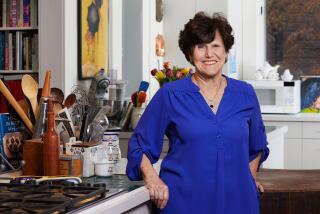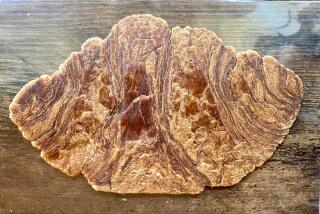Samuel Fromartz’s search for a ‘Perfect Loaf’ reveals so much more
Bread bakers are a breed unto themselves. Limited to only four basic ingredients — flour, water, salt and yeast — they tend to drill down rather than branch out. Talk to even a beginning bread baker for very long and the conversation will quickly turn to protein percentages, hydration ratios and folding techniques.
What might seem odd to non-bakers is that they never seem to regard this shortage of ingredients as limiting. If you want to understand why, pick up Samuel Fromartz’s terrific new book “In Search of the Perfect Loaf.”
Fromartz was bitten by the bread bug early. But after years of home dabbling, he decided to get serious about it. Very serious. His first step was flying to Paris to apprentice at a great boulangerie. (Because he wanted to perfect his baguette; any bread baker would understand.)
But Fromartz is much more than an obsessive cook. He’s also a fine reporter and writer. And “Perfect Loaf” is much more than a book about baking bread.
In true bread baker fashion, Fromartz takes what might seem like the narrow window of bread baking and uses it as an opportunity to explore a wide range of topics.
And so in searching for the perfect crumb and crust, he also teaches us about starch chemistry, about the history of bread, about the development of sourdough and some of its ramifications, about the biology of yeasts, about the history of wheat, about the implications of industrial agriculture, about the psychology of bakers, and about bread as a cultural artifact. And that’s just a small sample.
There are recipes, but they are secondary. And even though I’m not a bread baker, just reading them, it seems to me that they would be useful to both the beginning and moderately experienced baker, as Fromartz writes clearly and helpfully about the techniques involved.
And, of course, with only four main ingredients and a fairly set order of steps (mix ingredients, develop structure, cook), in bread baking technique is everything.
Indeed, the book’s overarching thesis seems to be an appreciation of bread as a craft object. In the introduction, Fromartz compares bread baking to woodworking and through the book’s various zigs and zags you can see that as a constant. Where a carpenter might write about different woods, he writes about the effects of different flours. Where one might write about methods of joinery, he writes about the effects of different leaveners.
Although the book is ostensibly about baking, what Fromartz is really writing about is how a deeper understanding of something leads to a deeper appreciation of it.
He is showing us the world through a slice of bread.
Are you a food geek? Follow me on Twitter @russ_parsons1
More to Read
Eat your way across L.A.
Get our weekly Tasting Notes newsletter for reviews, news and more.
You may occasionally receive promotional content from the Los Angeles Times.







